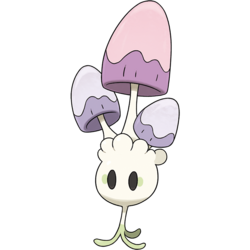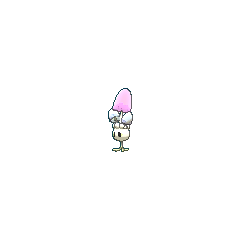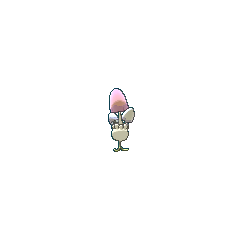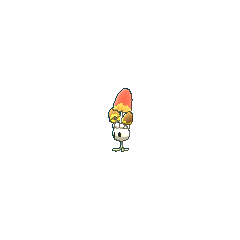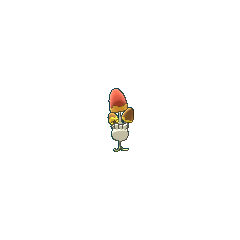From Bulbapedia, the community-driven Pokémon encyclopedia.
|
|
| Line 39: |
Line 39: |
|
| |
|
| ==Biology== | | ==Biology== |
| Morelull is a small, white Pokémon similar to a mushroom. It has large, black eyes with pale green half-circle markings on the outer sides. Small bumps ring the top of its head, similar to hair. Its head is much larger than its thin, stem-like body. At the base, the stem splits into three green roots that act as feet. Three large mushrooms sprout from the center of its head. Each mushroom has a thin white stem and a darker ring of color around the base of the cap. The center and largest mushroom is light pink, while the other two mushrooms are smaller and a light purplish-blue. At night, Morelull can make the spores filling its mushroom caps glow. | | Morelull is a small, white Pokémon similar to a mushroom. It is tied with {{p|Budew}}, {{p|Foongus}}, and {{p|Shaymin}} as the [[List of Pokémon by height|shortest]] {{type|Grass}}. It has large, black eyes with pale green half-circle markings on the outer sides. Small bumps ring the top of its head, similar to hair. Its head is much larger than its thin, stem-like body. At the base, the stem splits into three green roots that act as feet. Three large mushrooms sprout from the center of its head. Each mushroom has a thin white stem and a darker ring of color around the base of the cap. The center and largest mushroom is light pink, while the other two mushrooms are smaller and a light purplish-blue. At night, Morelull can make the spores filling its mushroom caps glow. |
|
| |
|
| Morelull likes dark damp areas, but changes locations every night avoid depriving the plants in any one area of too many nutrients. In addition to locomotion, its roots are also used to communicate with other Morelull.<ref>[http://www.pokemon-sunmoon.com/en-us/pokemon/morelull/ Pokémon Sun and Moon site | Murelull]</ref> When in danger, it scatters spores that burst into bright, glittering sparks. The pulsing light of the spores can induce drowsiness. It is rumored that once, when a group of Morelull were disturbed and all threw out their spores at once, a plane passing overhead suffered a near brush with disaster.<ref>[http://www.pokemon.co.jp/ex/sun_moon/pokemon/160812_01.html Japanese Pokémon Sun and Moon site]</ref> | | Morelull likes dark damp areas, but changes locations every night avoid depriving the plants in any one area of too many nutrients. In addition to locomotion, its roots are also used to communicate with other Morelull.<ref>[http://www.pokemon-sunmoon.com/en-us/pokemon/morelull/ Pokémon Sun and Moon site | Murelull]</ref> When in danger, it scatters spores that burst into bright, glittering sparks. The pulsing light of the spores can induce drowsiness. It is rumored that once, when a group of Morelull were disturbed and all threw out their spores at once, a plane passing overhead suffered a near brush with disaster.<ref>[http://www.pokemon.co.jp/ex/sun_moon/pokemon/160812_01.html Japanese Pokémon Sun and Moon site]</ref> |
Revision as of 15:10, 12 May 2019
Morelull (Japanese: ネマシュ Nemasyu) is a dual-type Grass/Fairy Pokémon introduced in Generation VII.
It evolves into Shiinotic starting at level 24.
Biology
Morelull is a small, white Pokémon similar to a mushroom. It is tied with Budew, Foongus, and Shaymin as the shortest Grass-type. It has large, black eyes with pale green half-circle markings on the outer sides. Small bumps ring the top of its head, similar to hair. Its head is much larger than its thin, stem-like body. At the base, the stem splits into three green roots that act as feet. Three large mushrooms sprout from the center of its head. Each mushroom has a thin white stem and a darker ring of color around the base of the cap. The center and largest mushroom is light pink, while the other two mushrooms are smaller and a light purplish-blue. At night, Morelull can make the spores filling its mushroom caps glow.
Morelull likes dark damp areas, but changes locations every night avoid depriving the plants in any one area of too many nutrients. In addition to locomotion, its roots are also used to communicate with other Morelull.[1] When in danger, it scatters spores that burst into bright, glittering sparks. The pulsing light of the spores can induce drowsiness. It is rumored that once, when a group of Morelull were disturbed and all threw out their spores at once, a plane passing overhead suffered a near brush with disaster.[2]
Morelull and its evolution are the only known Pokémon that can learn the move Strength Sap by leveling up.
In the anime
Major appearances
Multiple Morelull debuted in Lulled to La-La Land!, where they evolved into Shiinotic. One Morelull had been draining energy from Ash and his classmates to help sustain a tree.
Minor appearances
Two Morelull appeared in Mallow and the Forest Teacher!, where they helped provide light at Oranguru's bar. One of them reappeared in Acting True to Form!. They reappeared in the Poké Problem segment of SM121.
A Morelull appeared in Tasting the Bitter with the Sweet!, during a flashback.
Multiple Morelull appeared in Dewpider Ascending!, where they walked past a sleeping Dewpider and led it to a tree before falling asleep.
A Morelull appeared in The Shape of Love to Come!, where it was approached by Rapp, who found it cute.
A Trainer's Morelull appeared in We Know Where You're Going, Eevee!.
Pokédex entries
| Episode
|
Pokémon
|
Source
|
Entry
|
| SM029
|
Morelull
|
Rotom Pokédex
|
Morelull, the Illuminating Pokémon. A Grass and Fairy type. Morelull can send out glowing spores that put its opponents to sleep. Then it drains their energy using its foot-like roots.
|
|
In the manga
In the Pokémon Adventures manga
Two Morelull debuted in PASM11. One was seen helping Moon and Mallow gather Berries at Lush Jungle.
A Trainer's Morelull appeared in PASM19.
In the TCG
- Main article: Morelull (TCG)
Other appearances
Multiple Morelull appeared in Detective Pikachu.
Game data
Pokédex entries
| This Pokémon was unavailable prior to Generation VII.
|
| Generation VII
|
|
Alola
SM: #145
|
|
Alola
USUM: #178
|
| Sun
|
It scatters spores that flicker and glow. Anyone seeing these lights falls into a deep slumber.
|
| Moon
|
As it drowses the day away, it nourishes itself by sucking from tree roots. It wakens at the fall of night, wandering off in search of a new tree.
|
| Ultra Sun
|
It scatters its shining spores around itself. Even though they're dangerous, nighttime tours of forests where Morelull live are popular.
|
| Ultra Moon
|
It likes damp dark places. When night falls, the spores filling the caps of its mushrooms glow.
|
|
|
Game locations
| This Pokémon was unavailable prior to Generation VII.
|
|
|
In side games
Held items
Stats
Base stats
| Stat
|
Range
|
| At Lv. 50
|
At Lv. 100
|
40
|
|
100 - 147
|
190 - 284
|
35
|
|
36 - 95
|
67 - 185
|
55
|
|
54 - 117
|
103 - 229
|
65
|
|
63 - 128
|
121 - 251
|
75
|
|
72 - 139
|
139 - 273
|
15
|
|
18 - 73
|
31 - 141
|
Total: 285
|
Other Pokémon with this total
|
- Minimum stats are calculated with 0 EVs, IVs of 0, and (if applicable) a hindering nature.
- Maximum stats are calculated with 252 EVs, IVs of 31, and (if applicable) a helpful nature.
|
Type effectiveness
| Under normal battle conditions in Generation IX, this Pokémon is:
|
|
|
|
|
|
|
|
|
|
|
|
|
Learnset
|
|
|
|
- Bold indicates a move that gets STAB when used by Morelull
- Italic indicates a move that gets STAB only when used by an Evolution of Morelull
|
|
|
|
|
- Bold indicates a move that gets STAB when used by Morelull
- Italic indicates a move that gets STAB only when used by an Evolution of Morelull
|
|
|
|
|
- Moves marked with an asterisk (*) must be chain bred onto Morelull in Generation VII
- Moves marked with a double dagger (‡) can only be bred from a Pokémon who learned the move in an earlier generation.
- Moves marked with a superscript game abbreviation can only be bred onto Morelull in that game.
- Bold indicates a move that gets STAB when used by Morelull
- Italic indicates a move that gets STAB only when used by an Evolution of Morelull
|
|
|
|
|
- A black or white abbreviation in a colored box indicates that Morelull can be tutored the move in that game
- A colored abbreviation in a white box indicates that Morelull cannot be tutored the move in that game
- Bold indicates a move that gets STAB when used by Morelull
- Italic indicates a move that gets STAB only when used by an Evolution of Morelull
|
Side game data
Evolution
Sprites
| This Pokémon was unavailable prior to Generation VII.
|
|
|
Trivia
- Morelull and its evolved form are the only Pokémon that can have Rain Dish that cannot learn Rain Dance.
- Morelull can be seen as a counterpart to Paras. Both share the Grass type and the same base stat totals, both can learn Spore, and both can be found in the wild in Pokémon Sun and Moon, taking the place of the other depending on the time, with Morelull being found during the night and Paras at day.
Origin
Morelull may be based on bioluminescent mushrooms such as those of the genus Mycena, although its name suggests inspiration from the genus Morchella. Its Fairy type may be due to fairy rings, or it may possibly be a reference to fairy fire.
Given that some of the foreign names of its evolution include the word "lamp", and that Morelull shine lights and put people to sleep, it may also be based on a nightlight.
Name origin
Morelull may be a combination of morel and lull.
Nemasyu may be a combination of 寝 ne (sleep) and mushroom.
In other languages
| Language
|
Title
|
Meaning
|
 Japanese Japanese
|
ネマシュ Nemasyu
|
From 寝 ne and mushroom
|
 French French
|
Spododo
|
From spore and dodo
|
 Spanish Spanish
|
Morelull
|
Same as English name
|
 German German
|
Bubungus
|
From Bubu and fungus
|
 Italian Italian
|
Morelull
|
Same as English name
|
 Korean Korean
|
자마슈 Jamasyu
|
From 잠 jam and mushroom
|
 Mandarin Chinese Mandarin Chinese
|
睡睡菇 Shuìshuìgū
|
From 睡 shuì and 蘑菇 mógū
|
 Cantonese Chinese Cantonese Chinese
|
睡睡菇 Seuihseuihgū
|
From 睡 seuih and 蘑菇 mòhgū
|
|
|
|
| More languages
|
 Russian Russian
|
Морилалл Morilall
|
Transcription of English name
|
|
|
|
Related articles
Notes
External links

|
This Pokémon article is part of Project Pokédex, a Bulbapedia project that aims to write comprehensive articles on each Pokémon species, as well as Pokémon groups and forms.
|

 For other sprites and images, please see Morelull images on the Bulbagarden Archives.
For other sprites and images, please see Morelull images on the Bulbagarden Archives.
